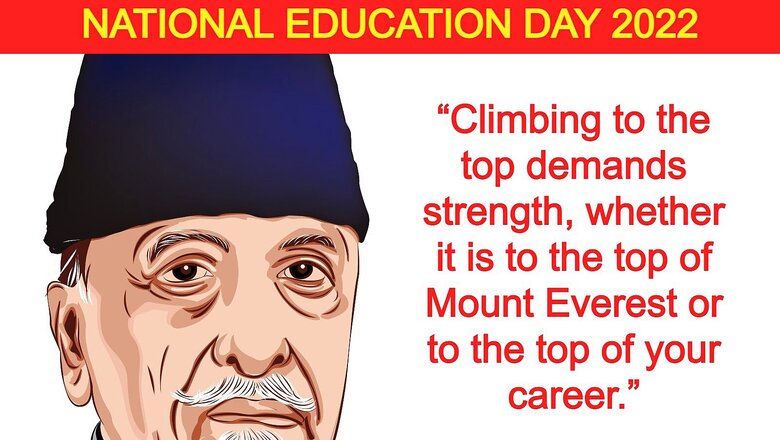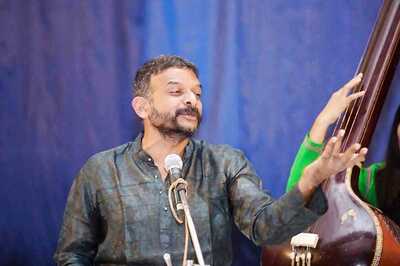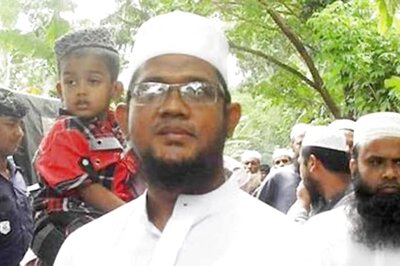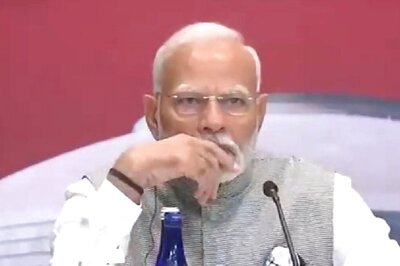
views
NATIONAL EDUCATION DAY 2022: National Education Day is celebrated on November 11 in India. It is to memorialize the birth anniversary of Maulana Abul Kalam Azad, the first Minister for Education in independent India. The day celebrates his exemplary contributions to the field of education and institution building.
Maulana Abul Kalam Azad was not only one of the most influential independence activists but also a noted writer, poet, and journalist. Here are 10 things you probably did not know about Maulana Azad:
First Education Minister Of India
Maulana Abul Kalam Azad was the first Education Minister of independent India. He played a crucial role in the formation of the national education policy of independent India.
Also read| National Education Day 2022: India’s First Education Minister Maulana Abul Kalam Azad Was Homeschooled
Birth Name
He was born Abul Kalam Ghulam Muhiyuddin on November 11, 1888. He adopted the alias Abul Kalam Azad and gained recognition for his writings.
Youngest President Of The Indian National Congress
In 1923, at an age of 35, Maulana Azad became the youngest person to serve as the President of the Indian National Congress. He was elected as Congress President in 1923 and 1940.
Established Jamia Millia Islamia
Jamia Millia Islamia was originally established at Aligarh in United Provinces, India in 1920. Maulana Azad was the founder of the Jamia Millia Islamia Institution along with fellow khilafat leaders.
Read| National Education Day: Despite Improvement, Many Schools Still do not Have Electricity, Toilets
Published An Urdu Weekly
To ignite the passion of Indians as well as foreign revolutionary leaders, Maulana Azad began publishing a weekly called “Al-Hilal” in 1912. He used it to attack the policies of the British Government and highlight the problems faced by the common Indians. But in 1914, the British Government put a ban on the weekly.
Opposed The Formation Of Pakistan
Maulana Azad was against the idea of partition. His vehement opposition was because the idea of partition was based on religion. He was disappointed when the idea turned into reality, giving rise to Pakistan.
Rejected Communal Separatism
He did not agree with the Muslim politicians who were more focused on communal issues than that on issues of national interest. Maulana Azad also rejected the idea of communal separatism advocated by the All-India Muslim League.
Read| Why is National Education Day Celebrated on November 11? Theme, History and Significance
Positions Held In Indian National Congress
He emerged as a prominent leader in the Indian National Congress. Maulana Azad also served as a member of the Congress Working Committee (CWC) and in the offices of the general secretary and president on several occasions.
Against Separate Electorates
Unlike Muhammad Ali Jinnah, Maulana Azad was in favour of the ending of separate electorates based on religion. Furthermore, he called for a single nation committed to secularism.
Bharat Ratna Awardee
Maulana Abul Kalam Azad was posthumously awarded India’s highest civilian honour, the ‘Bharat Ratna’ in 1992. It was for his invaluable contribution to the nation as a freedom fighter, a prominent political leader, and an education minister.
Read all the Latest Education News here


















Comments
0 comment